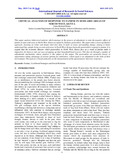| dc.contributor.author | Otieno, Richard J. | |
| dc.date.accessioned | 2020-11-10T15:13:24Z | |
| dc.date.available | 2020-11-10T15:13:24Z | |
| dc.date.issued | 2019-05 | |
| dc.identifier.citation | International Journal of Research In Social Sciences, May. 2019. Vol. 30, No.1 | en_US |
| dc.identifier.issn | 2307-227X | |
| dc.identifier.uri | http://hdl.handle.net/123456789/4451 | |
| dc.description.abstract | This paper analyses behavioral patterns which emerges in the process of adjustment to stem the negative effects of famine in semi-arid areas in North West, Kenya occupied by Turkana pastoralists. The paper takes a more qualitative approach, focusing on richer and deeper interview data. It looks at issues surrounding change, aiming to better understand how people living in semi-arid areas in North West, Kenya (basically pastoralists) respond to famine. It is argued that the economic disaster which pastoralists in North West, Kenya face as a result of famine make it imperative for them to seek out ways of topping up their household food reserves. This they do through a number of adjustments mechanisms whose analysis is the subject of this paper. The pastoralists are generally known as opportunists taking advantage of various options for subsistence, which again is an adaptation to the risks of their environment. The analysis is based primarily on the interpretation of the questionnaire interview responses. | en_US |
| dc.language.iso | en | en_US |
| dc.subject | Famine | en_US |
| dc.subject | Livelihood Strategies and Social Relations | en_US |
| dc.title | Critical Analysis of Response to Famine in Semi-Arid Areas of North West, Kenya | en_US |
| dc.type | Article | en_US |

